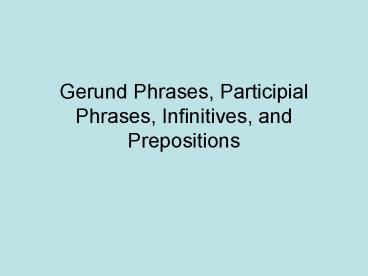Gerund Phrases, Participial Phrases, Infinitives, and Prepositions - PowerPoint PPT Presentation
1 / 26
Title:
Gerund Phrases, Participial Phrases, Infinitives, and Prepositions
Description:
Gerund Phrases, Participial Phrases, Infinitives, and ... Preposition verb phrase that serves as a noun. Infinitive verb phrase that ... Dave's hobby. ... – PowerPoint PPT presentation
Number of Views:1230
Avg rating:3.0/5.0
Title: Gerund Phrases, Participial Phrases, Infinitives, and Prepositions
1
Gerund Phrases, Participial Phrases, Infinitives,
and Prepositions
2
Match the term with its definition.
- Preposition verb phrase that serves as a
noun - Infinitive verb phrase that serves as an
adjective - Participle to a verb
- Gerund indicates temporal or spatial
location
3
Match the term with its definition.
- Preposition verb phrase that serves as a
noun - Infinitive verb phrase that serves as an
adjective - Participle to a verb
- Gerund indicates temporal or spatial
location
4
Match the term with its definition.
- Preposition verb phrase that serves as a
noun - Infinitive verb phrase that serves as an
adjective - Participle to a verb
- Gerund indicates temporal or spatial
location
5
Match the term with its definition.
- Preposition verb phrase that serves as a
noun - Infinitive verb phrase that serves as an
adjective - Participle to a verb
- Gerund indicates temporal or spatial
location
6
Match the term with its definition.
- Preposition verb phrase that serves as a
noun - Infinitive verb phrase that serves as an
adjective - Participle to a verb
- Gerund indicates temporal or spatial
location
7
Where are the prepositions in the sentence?
- On the bus ride to the game, I got to practice
plays in my mind.
8
Where are the prepositions in the sentence?
- On the bus ride to the game, I got to practice
plays in my mind.
9
Why does the first one need a comma, but not the
second?
- On the bus ride to the game, I got to practice
plays in my mind. - Infinitives and prepositions only need commas
if they are introductory phrases.
10
Where is the infinitive in the sentence?
- On the bus ride to the game, I got to practice
plays in my mind.
11
Where is the infinitive in the sentence?
- On the bus ride to the game, I got to practice
plays in my mind.
12
Which is the gerund, and which is the participle?
- Leaving for college is both stressful and fun.
- Kelly ran to her car, forgetting her purse on
the table.
13
Which is the gerund, and which is the participle?
- Leaving for college is both stressful and fun.
- Kelly ran to her car, forgetting her purse on
the table.
14
Which is the gerund, and which is the participle?
- Leaving for college is both stressful and fun.
- Kelly ran to her car, forgetting her purse on
the table.
15
Which is the gerund, and which is the participle?
- Leaving for college is both stressful and fun.
- Kelly ran to her car, forgetting her purse on
the table.
16
Comma Rules
- Gerunds no commas
- Dave loves watching sports.
- Watching sports is Daves hobby.
- Infinitives and prepositions no commas, unless
theyre introductory phrases - To get her out of jail, her parents paid 100.
- Her parents paid 100 to get her out of jail.
17
Participial Comma Rule
- At the beginning of the sentence
18
Participial Comma Rule
- At the beginning of the sentence
- use a comma.
- Following the directions carefully, Lisa found
the building.
19
- In the middle of the sentence
20
- In the middle of the sentence
- decide if the participle is necessary.
- -If it is, dont use commas.
- -If it isnt, use commas to show we could
slide it out of the sentence without changing
the meaning.
21
- That man wearing the blue sweater stole my
wallet. - Julie, wearing the blue sweater, walked
outside.
22
- If its at the end of the sentence
23
- If its at the end of the sentence
- look at what it modifies.
- -If it immediately follows the word it
modifies, dont use a comma - -If it modifies a word earlier in the sentence,
use a comma
24
- Kurt bought a llama spending 500.
25
- Kurt bought a llama spending 500.
26
- Kurt bought a llama, spending 500.































